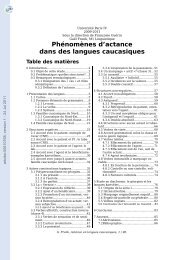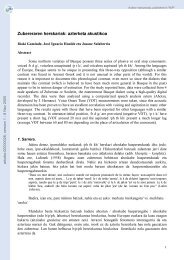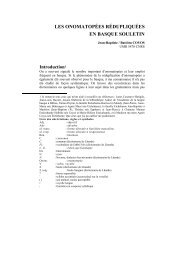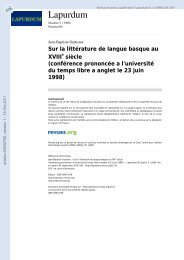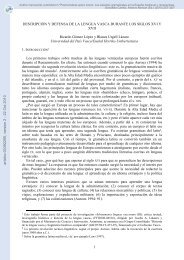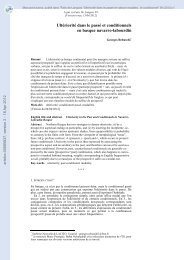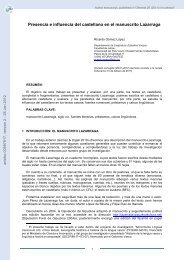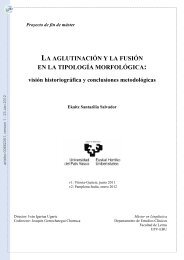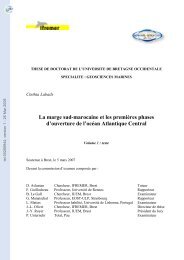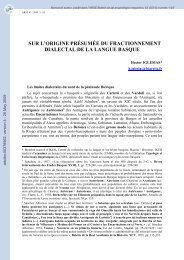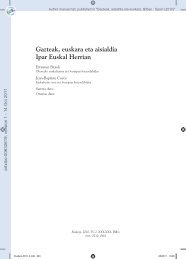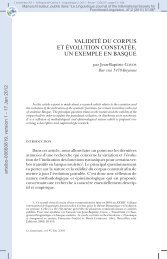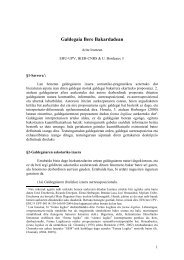On the polysemy of the suffike-ke in the history of Northern Basque
On the polysemy of the suffike-ke in the history of Northern Basque
On the polysemy of the suffike-ke in the history of Northern Basque
Create successful ePaper yourself
Turn your PDF publications into a flip-book with our unique Google optimized e-Paper software.
artxibo-00494270, version 1 - 22 Jun 2010<br />
480 GEORGES REBUSCHI<br />
ability <strong>in</strong> NL today, but it could also have a future value until at least <strong>the</strong> middle <strong>of</strong><br />
<strong>the</strong> 20th century (just as it has always had <strong>in</strong> Zub.). This latter semantic import is<br />
obviously l<strong>in</strong><strong>ke</strong>d to <strong>the</strong> “prediction” contribution -<strong>ke</strong> has always had <strong>in</strong> <strong>the</strong> <strong>in</strong>flected<br />
verb forms used <strong>in</strong> <strong>the</strong> apodoses <strong>of</strong> conditional sentences (referr<strong>in</strong>g to ei<strong>the</strong>r a fictitious<br />
or a possible or real world). Thus, <strong>in</strong> NL, <strong>the</strong> suffix -<strong>ke</strong> is not <strong>in</strong>herently potential:<br />
<strong>in</strong> <strong>the</strong>se dialects at least, it is only potential when suffixed to <strong>the</strong> defective, aoristic<br />
auxiliaries (aux 2 ) <strong>in</strong> <strong>the</strong> present and past tenses, associated with <strong>the</strong> radical <strong>of</strong> a<br />
lexical verb (and <strong>the</strong> correspond<strong>in</strong>g syn<strong>the</strong>tic forms).<br />
F<strong>in</strong>ally, -<strong>ke</strong> could also <strong>in</strong>dicate <strong>the</strong> spea<strong>ke</strong>r’s strong commitment to what s/he said.<br />
This suffix is thus an underspecified modal morpheme, whose more precise <strong>in</strong>terpretation<br />
is sometimes, but not always, dictated by its morpho-syntactic environment.<br />
Appendix: <strong>the</strong> distribution <strong>of</strong> -<strong>ke</strong> and related conjugated forms<br />
<strong>in</strong> <strong>the</strong> Recueil Bourciez<br />
As <strong>the</strong> examples <strong>in</strong> <strong>the</strong> paper all come from religious sources, and can thus be<br />
considered to be stylistically biassed, I wish to provide here a description <strong>of</strong> <strong>the</strong> 140<br />
over translations <strong>in</strong>to Nor<strong>the</strong>rn <strong>Basque</strong> <strong>of</strong> <strong>the</strong> five French future tenses, and <strong>the</strong> one<br />
past conditional, found <strong>in</strong> a text55 which was systematically translated <strong>in</strong>to <strong>the</strong> local<br />
subdialects <strong>in</strong> <strong>the</strong> very late 19th century (Aurrekoetxea & Videga<strong>in</strong> eds., 2004). 56<br />
Here are <strong>the</strong> ma<strong>in</strong> results.<br />
(a) The “pure” future: 57 (Je vais me lever, j’irai trouver mon père) et [je] lui dirai…,<br />
‘I’ll go to my fa<strong>the</strong>r and will tell him…’ (§5) [Lk 15,18]<br />
‘[Je] lui dirai’ is always translated by a (morpho-phonological variant <strong>of</strong> <strong>the</strong>)<br />
basic form <strong>of</strong> <strong>the</strong> unmar<strong>ke</strong>d type: joanen naiz.<br />
(b) A future passive: Tu seras puni, ‘You’ll be punished.’ (§2) [No counterpart <strong>in</strong><br />
Lk]<br />
This case is more <strong>in</strong>terest<strong>in</strong>g, s<strong>in</strong>ce <strong>the</strong> passive is periphrastic: 58 <strong>the</strong> perfective participle<br />
ei<strong>the</strong>r agrees <strong>in</strong> number with <strong>the</strong> (promoted) subject (Lap. & NL) or is followed<br />
by <strong>the</strong> partitive suffix -(r)ik (Zub.). The question is <strong>the</strong>n whe<strong>the</strong>r izan ‘be’ is<br />
itself <strong>in</strong> <strong>the</strong> prospective, and followed by an auxiliary (<strong>the</strong> same ‘be’) <strong>in</strong> <strong>the</strong> present<br />
55 In spite <strong>of</strong> its title, it is a secularized —and expanded— version <strong>of</strong> Lk 15,11-32, translated <strong>in</strong> almost<br />
every local variety <strong>of</strong> <strong>Basque</strong> and Gascon <strong>in</strong> <strong>the</strong> last decade <strong>of</strong> <strong>the</strong> 19th century. Of course, A&V<br />
(2004) only provides <strong>the</strong> <strong>Basque</strong> versions. For details, see Videga<strong>in</strong> (2005).<br />
56 150 tranlations are announced, but some texts are simply dist<strong>in</strong>ct transcriptions <strong>of</strong> <strong>the</strong> very same<br />
tranlations. Besides, sometimes, <strong>the</strong> translation is ei<strong>the</strong>r skipped, or too removed from <strong>the</strong> orig<strong>in</strong>al to be<br />
considered here.<br />
57 The idiomatic use <strong>of</strong> aller is usually translated by a simple prospective future, e.g. xuti.tuko naiz,<br />
except <strong>in</strong> a handful <strong>of</strong> periphrases, namely xutizera(t) noa with «to go» and a nom<strong>in</strong>alized verb <strong>in</strong> <strong>the</strong><br />
allative case (4 <strong>in</strong>stances <strong>in</strong> Lap.), but also with nahi izan/°edun «want» (BN, 2 <strong>in</strong>stances, Zub., 3 <strong>in</strong>stances),<br />
and with behar izan/°edun «must/have to» (Lap., one case). The translation <strong>of</strong> <strong>the</strong> second verb<br />
(j’irai) is <strong>of</strong>ten dependent on <strong>the</strong> translation <strong>of</strong> <strong>the</strong> first one, which is <strong>the</strong> reason why I’m also leav<strong>in</strong>g it<br />
out here.<br />
58 It is <strong>the</strong> (proportionately) high frequency <strong>of</strong> <strong>the</strong> word order <strong>of</strong> type III below which I ta<strong>ke</strong> as a<br />
test that <strong>the</strong> <strong>Basque</strong> passive is periphrastic ra<strong>the</strong>r than analytic. See also ex. (a) <strong>in</strong> footnote 23 on this<br />
matter.<br />
0 ASJU Oyharcabal.<strong>in</strong>dd 480 21/07/09 12:54



